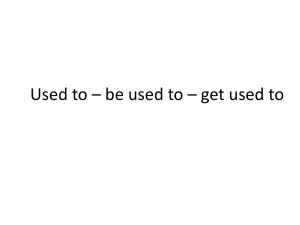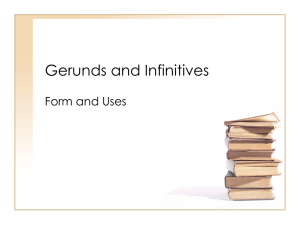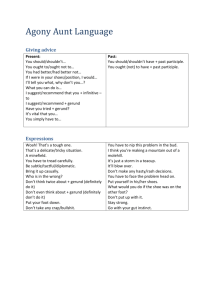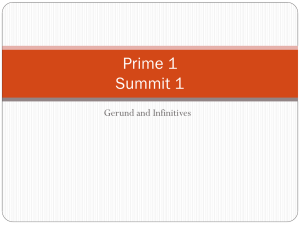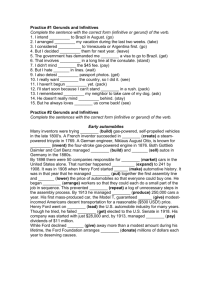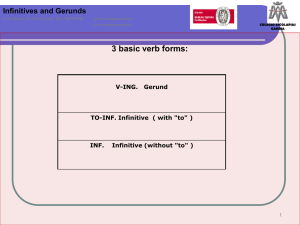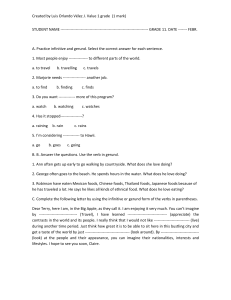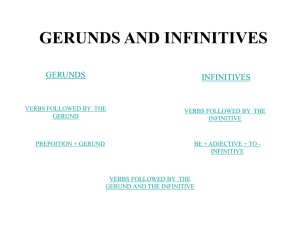GERUND (HAUPTWÖRTLICH GEBRAUCHTE ZEITWÖRTER)
advertisement
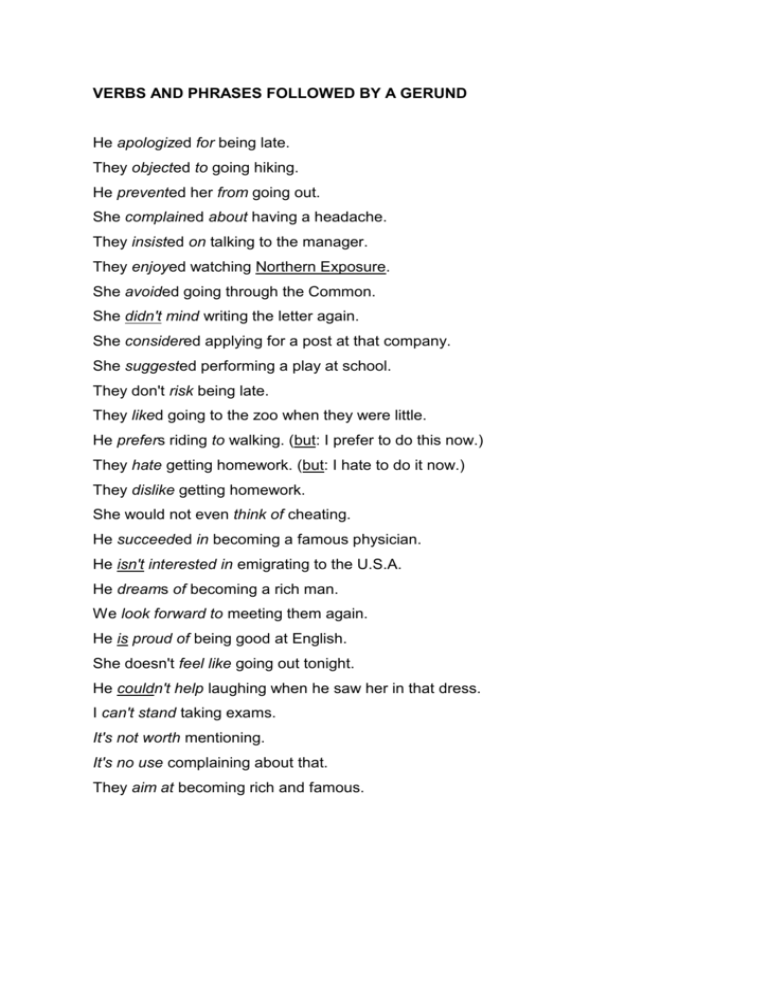
VERBS AND PHRASES FOLLOWED BY A GERUND He apologized for being late. They objected to going hiking. He prevented her from going out. She complained about having a headache. They insisted on talking to the manager. They enjoyed watching Northern Exposure. She avoided going through the Common. She didn't mind writing the letter again. She considered applying for a post at that company. She suggested performing a play at school. They don't risk being late. They liked going to the zoo when they were little. He prefers riding to walking. (but: I prefer to do this now.) They hate getting homework. (but: I hate to do it now.) They dislike getting homework. She would not even think of cheating. He succeeded in becoming a famous physician. He isn't interested in emigrating to the U.S.A. He dreams of becoming a rich man. We look forward to meeting them again. He is proud of being good at English. She doesn't feel like going out tonight. He couldn't help laughing when he saw her in that dress. I can't stand taking exams. It's not worth mentioning. It's no use complaining about that. They aim at becoming rich and famous. GERUND Swimming is healthy. GERUND Swimming in the river, he drowned VERB Verbs that can be followed by both INFINITIVE and GERUND constructions! MIND THE DIFFERENCES IN MEANING! to try to do something to try doing sth make an effort; attempt to do sth difficult make an experience do sth to see what will happen to stop to do sth make a break/pause in order to do sth to stop doing sth stop what one is doing/what one does to like to do something choose to do sth (for a change) think it right to would like to do wish, want to do to like doing sth enjoy doing something to remember to do sth remember what one has to do to remember doing sth remember what one has done remember what has happened to go on to do sth change; move on to do sth new to go on doing sth continue what one has been doing forget to do forget what one has to do forget doing forget what one has done/what has happened regret to do be sorry for what one is going to say regret doing be sorry for what has happened interested to do interested by what one learns interested in doing interested by the idea of doing sth X used to do refers to past habits and states to be used to doing made familiar with; accustomed to GERUND or INFINITIVE? With remember, forget, stop, go on and regret the difference of meaning, which is the result of the gerund/infinitive, is connected with time. The Gerund refers to things that happen earlier (before the remembering, forgetting, etc take place), the infinitive refers to things that happen after the remembering etc. If you refer to a particular occasion, you have to use the infinitive after love, hate and prefer. If you refer to habits, you should use the Gerund Allow, advise, forbid and permit are followed by the Gerund if there is no personal object. If we say who is allowed etc, the infinitive is used. We use the Gerund after see, watch and hear if we suggest that we only observe part of a complete action (i.e. if we start looking or listening it is already going on). However, the infinitive is used if we want to suggest that we observe the whole action from the very beginning to the end. If we are talking about things which happen to us unexpectedly, without our wanting or choosing them, you have to use the Gerund after afraid of. After propose, attempt, intend, continue, can't bear and be accustomed to both structures are possible with little difference of meaning, but the infinitive is probably more common after propose, attempt and intend. Sorry is used with an infinitive when we apologize for something that we are doing or about to do. However, if we apologize for something that we have done, we use a perfect infinitive, for + Gerund or a that - clause. Begin and start can be followed by Gerund or infinitive structures usually with no real difference of meaning.However, it is more common to use the gerund if we are talking about the beginning of a long or habitual activity, but this form is not used after a progressive form of begin or start. After begin and start the verbs understand and realize are only used in the infinitive. Put the verb in brackets in the correct form. 1. She insisted on (talk) to the manager. 2. Mary is going to (prepare) the dinner. 3. Who is (play) the main part? 4. You will have to (do) your homework soon. 5. I will have (write) the letters tonight. 6. She likes (play) Scrabble. 7. He enjoys (tell) jokes. 8. They appreciated (get) the consignment promptly. 9. She wrote a letter (ask) for a catalogue and price lists. 10. The letters were (write) and (post) last week. 11. They were proud of (be) (elect). 12. She was not (take) seriously. 13. If she had not (win), he would have (be) satisfied. 14. He couldn't be (prevent) from (apply) for that job. 15. We look forward to (do) business with you. 16. As (require) we enclose our current price list. 17. They used to (play) hide-and-seek when they (be) young. 18. She dreams of (become) the manager. 19. They suggested (go) to the opera. 20. He succeeded in (win) the Nobel prize. 21. They wanted to know how the problem could be (solve). 22. Please (note) that delivery must be (effect) by 10 November. 23. We (thank) you for your quotation of 10 June and (enclose) our Purchase Order No 2668 for preserves and marmelades. 24. The order is (place) on the understanding that the goods arrive here before 31 March. 25. We would (ask) you to (pay) special attention to careful packing. 26. A prompt and careful execution of this order will (lead) to regular repeats. 27. We shall not (accept) the consignment if it (arrive) after 31 May. 28. Please (supply) as (specify) below: 29. The quality must (be) up to the sample we enclose. 30. One of our customers has (go) out of business. to + infinitive or -ing? 1. I tried __________ (tell) her, but she wouldn't listen. 2. Why don't you try __________ (cook) it in the microwave? It'll be much quicker. 3. He was rushing down the road when suddenly he stopped __________ (buy) some flowers from a stall. 4. I've stopped __________ (drink) whisky. I only have gin and vodka now. 5. She just went on __________ (talk) even though he was clearly asleep. 6. After that boring story he went on __________ (explain) how he had got his arm trapped in the door. 7. I enjoy __________ (travel). 8. I'm looking forward to __________ (see) you at Christmas. 9. I'm not used to __________ (drive) in London. 10. I'm interested in __________ (work) in the USA. 11. What would you like _________ (do) tomorrow? 12. I like _________ (walk) in the rain. 13. I don't speak English because I'm afraid of _________ (make) mistakes. 14. She began _________ (understand) what he really wanted. 15. She is always forgetting _________ (give) me my letters. 16. I shall never forget _________ (see) the Queen. 17. I prefer _________ (ride) to _________ (walk). 18. Sally wants _________ (go) abroad. 19. Dan is proud of __________ (be) good at German. 20. I don't regret _________ (tell) her what I thought, even if it upset her. 21. I regret _________ (inform) you that we are unable ___________ (offer) you employment. 22. I'd love _________ (come) and _________ (see) you some time. 23. I like __________ (get) up early so that I can ________ (get) plenty of work done before lunch. 24. I heard you _________ (talk) and I didn't want __________ (disturb) you, so I went away. Put the verb in brackets in the correct form: gerund, infinitive or past participle? 1. She doesn't like ___________ (listen) to operas. 2. Many people enjoy ___________ (watch) soap operas. 3. Marc wants to ____________ (study) English literature. 4. Sarah could ___________ (explain) to them what to _____________ (do). 5. She often thinks of __________ (quit) her job. 5. Frank should _________ (do) his homework on his own. 6. George will _________ (travel) visit his friends in the U.S.A. next year. 7. They considered _________ (move) to London, but finally they decided against it. 8. If I were you, I would __________ (tell) her the truth. 9. She would not have _________ (do) it if she had _________ (know) the consequences. 10. We look forward to __________ (receive) further orders. 11. Have you ever _________ (think) of _________ (apply) at our company? 12. We ask you to __________ (quote) prices, delivery dates and terms of payment. 13. We have _________ (see) your advertisement in pour trade magazine. 14. I would _________ (be) interested in _________ (receive) catalogues and pricelists. 15. If your quotation meets our expectations, we can probably ________ (place) considerable orders with you. 16. We should _________ (appreciate) full particulars of your latest products. 17. We are glad to _________ (submit) the following quotation. 18. Please let us ________ (know) your requirements (Bedarf) by telegram. 19. You may ________ (rely) on a prompt and careful execution of your order. 20. We invite you to ________ (pay) a visit to our showrooms. 21. We were very pleased to ________ (receive) your inquiry of May 13th. 22. We take the liberty of ________ (send) a copy of our latest catalogue. 23. Prices and terms are ________ (give) in the attached list. 24. As _______ (indicate) the quality must ________ (be) up to the samples we sent you. 25. We enclose the our official order for the items on the understanding that you can ________ (supply) from stock. 26. These products are not ________ (suit) for our market. 27. The consignment is urgently _________ (require). 28. We hope you will _________ (give) your prompt attention to this order. 29. Please do not _________ (exceed) the time allowed for delivery. 30. The goods can be _________ (send) from stock. 31. The consignment will be _________ (despatch) on receipt of your remittance. 32. We shall ________ (lose) no time in ________ (send) the articles _________ (require) by you. Translate the following sentences by using the GERUND. 1. Er besteht darauf, sie nach Hause zu bringen. 2. Sie freuen sich darauf, ihre Verwandten wiederzusehen. 3. Er spielt gerne Fußball; sie spielt lieber Tennis. 4. Statt für die Schularbeit zu lernen (study), ging sie in eine Diskothek. 5. Es hat keinen Sinn, ihr die Wahrheit zu sagen; sie würde dir nicht glauben. 6. Er hatte Angst davor, ihr wieder zu begegnen. 7. Sie vergaß immer, die Blumen zu gießen. 8. Es tat ihr nicht leid, ihm die Wahrheit gesagt zu haben. 9. Er ist sehr stolz darauf, intelligent zu sein. 10. Du wirst nicht vermeiden können, wieder mit ihm zu arbeiten. 11. Sie schlugen vor, ins Kino zu gehen. 12. Es macht mir nichts aus, mit der U-Bahn zu fahren. 13. Sie sollten nicht riskieren, dort zu übernachten. 14. Er hinderte die Gegner daran, ein Tor zu erzielen. (to score a goal) 15. Sie protestierten dagegen, samstags Aufgaben zu bekommen. 16. Er interessiert sich dafür, die Kronjuwelen zu sehen. 17. Sie klagt dauernd über Kopfschmerzen. 18. Er entschuldigte sich für sein Zuspätkommen. 19. Sie bestand darauf, von Dr. Health operiert zu werden. 20. Es gelang ihm nicht, die ganze Nacht wach zu bleiben. 21. Hast du jemals daran gedacht, einen Arzt zu konsultieren. 22. Er träumt davon, ein berühmter Schauspieler zu werden. 23. Er schlug ihm vor, sie zu Ostern zu besuchen. 24. Sie hörten vor drei Jahren mit dem Rauchen auf.
